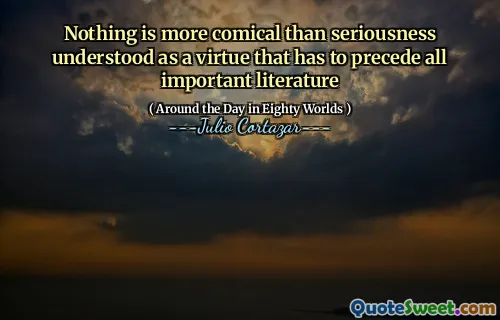Julio Cortázar was an influential Argentine writer known for his unique narrative style and innovative approach to storytelling. Born in 1914, he became a crucial figure in Latin American literature and was a prominent member of the literary movement known as the Latin American Boom. His works often broke conventional structures, blending fantasy with reality and playing with time and perspective. One of his most celebrated works is "Rayuela," or "Hopscotch," which invites readers to interact with the text in non-linear ways. This experimental novel allows multiple ways of reading, thereby engaging readers in the narrative's construction. Cortázar's writing reflects his interest in the surreal and the absurd, often incorporating playful elements that challenge traditional literary norms. Beyond fiction, Cortázar was also a dedicated translator and a passionate advocate for political and social changes in Latin America. His literary contributions not only shaped the landscape of Argentine literature but also influenced international literary trends. His ability to fuse the everyday with the extraordinary has left a lasting impact, making him a beacon of creative thought in literature.
Julio Cortázar, born in 1914 in Belgium and raised in Argentina, was a revolutionary figure in literature. He was part of the Latin American Boom, a period marked by the rise of influential writers from the region.
Cortázar's experimental style is exemplified in his renowned work "Rayuela," which allows readers to engage with the narrative in a non-linear manner, transforming the act of reading into an interactive experience.
His literary legacy extends beyond fiction, as he also played a significant role in political and social movements in Latin America, advocating for justice and change through his writings and translations.
More »
Today Birthdays
1729 -
Edmund Burke
1949 -
Haruki Murakami
1954 -
Howard Stern
1876 -
Jack London
1993 -
Zayn Malik
1951 -
Kirstie Alley
1863 -
Swami Vivekananda
1923 -
Alice Miller
1987 -
Naya Rivera
1825 -
Brooke Foss Westcott
1944 -
Joe Frazier
1951 -
Rush Limbaugh
1964 -
Jeff Bezos
1978 -
Jeremy Camp
1628 -
Charles Perrault
1856 -
John Singer Sargent
1970 -
Kaja Foglio
1953 -
Rick Santelli
1986 -
Gemma Arterton
1968 -
Raf Simons
1958 -
Christiane Amanpour
1966 -
Olivier Martinez
1996 -
Ella Henderson
1917 -
Maharishi Mahesh Yogi
1949 -
Ottmar Hitzfeld
1928 -
Ruth Brown
1968 -
Heather Mills
1946 -
George Duke
1968 -
Rachael Harris
1923 -
Ira Hayes

